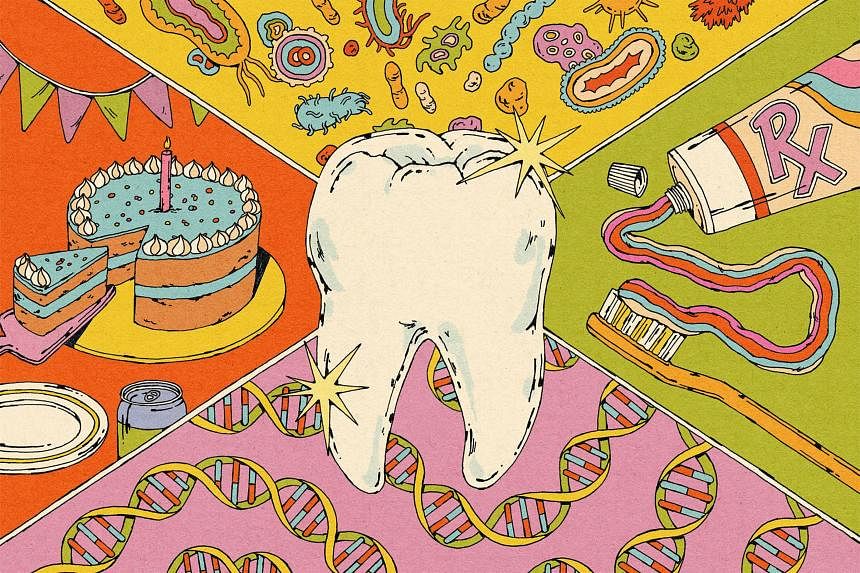NEW YORK – Having bright, beautiful teeth depends on more than just brushing twice a day.
It also depends on the strength of your enamel, the outermost layer of your teeth and the first line of defence against daily wear and tear. What you eat and drink, or even certain medical conditions or medications, can strip away the minerals that make your enamel so strong. And your genetics and early childhood experiences might also play a role in how tough your teeth are and how susceptible they are to cavities.
Here is what dentists want you to know about what weakens your teeth, and how to keep them strong.
What causes weak teeth?
Some people simply have thinner or more brittle enamel. This can be the result of relatively rare genetic disorders, such as amelogenesis imperfecta.
But enamel issues are more often associated with environmental factors that could disrupt its formation in utero or in early childhood, said Dr Isabelle Chase, director of the paediatric dental residency programme at the Harvard School of Dental Medicine.
Research has linked prenatal health issues like vitamin D deficiency or gestational diabetes to greater incidence of enamel defects in children. Some studies have also suggested that malnutrition in infancy and early childhood diseases such as measles, pneumonia or even frequent high fevers may be linked to weaker enamel.
The weaker the enamel, the more sensitive your teeth are, especially to heat or cold. You may also be more prone to cavities, Dr Chase said.
In older teens and adults, acidic foods and drinks cause most of the enamel erosion that dentists see, she added. These include fruit juices, sports drinks, sodas, sparkling water and foods that have vinegar, like pickles.
Coffee, while somewhat acidic, is not as erosive as citrus drinks and sodas, especially in moderate amounts. But if you add sugar to your morning cup, it could feed the bacteria in your mouth, Dr Chase said, which then produce acid that can weaken your teeth. This is a separate process from direct erosion from acid in food.
Items that stick to your teeth are problematic for the same reason. If you eat or drink them frequently, your enamel will slowly lose its minerals and become weaker and more vulnerable to cavities or chips, said Dr Daniel H. Fine, chair of the department of oral biology at the Rutgers School of Dental Medicine.
“If you had one chocolate bar, and you ate it all at once, you would have one big exposure to food that causes acid to be produced on your teeth,” he said. But if you broke it into pieces and ate it over several sittings, “you would have multiple exposures to acid”, he added, which can do more damage.
A person’s teeth – particularly those in the back of the mouth – can also be weakened by chronic acid reflux or frequent vomiting. Certain occupational exposures, such as to sulphuric or hydrochloric acid, may also put people at higher risk of enamel erosion.
Saliva can stave off damage by buffering or neutralising acid in the mouth, Dr Fine said. It can also coat teeth with important minerals that help with remineralisation, like calcium from dark leafy greens or phosphorus from nuts, beans and meats.
But people who have chronic dry mouth because of certain medical conditions or medications may lack this protection and, therefore, also be prone to weakened teeth.
A dentist can tell if you have enamel issues by looking at your teeth under a bright light or, in some cases, using an X-ray to assess enamel density.
What can you do to strengthen teeth?
Although some factors are uncontrollable, there are steps you can take to protect and strengthen your enamel.
Brushing and flossing diligently are essential, Dr Chase said. But you should wait half an hour to an hour after eating or drinking to give your saliva time to wash acid away before you brush.
The American Dental Association recommends using products that contain fluoride, which brings calcium and phosphorus together in your saliva to make enamel harder and more resistant to decay.
Dentists might also recommend a fluoride mouthwash or prescribe high-fluoride toothpaste for people who have weaker teeth or are more susceptible to cavities. However, all these treatments are most effective in the early stages of enamel damage, Dr Fine said.
To prevent erosion, Dr Chase said to try to limit your consumption of acidic foods and beverages.
Avoid sipping on drinks for long periods of time and grazing continuously on snacks, which exposes your teeth to acid more frequently and feeds the bacteria in your mouth. Rinse your mouth after you eat and drink water regularly to help increase your saliva production and counter some of the effects of erosion.
Scheduling regular dental check-ups can also pay dividends, allowing you to catch and repair damage early on. If enamel is continually eroded, the damage cannot be undone. Cracks and cavities are permanent, and the last thing you want to do is go for a filling when in pain. NYTIMES

